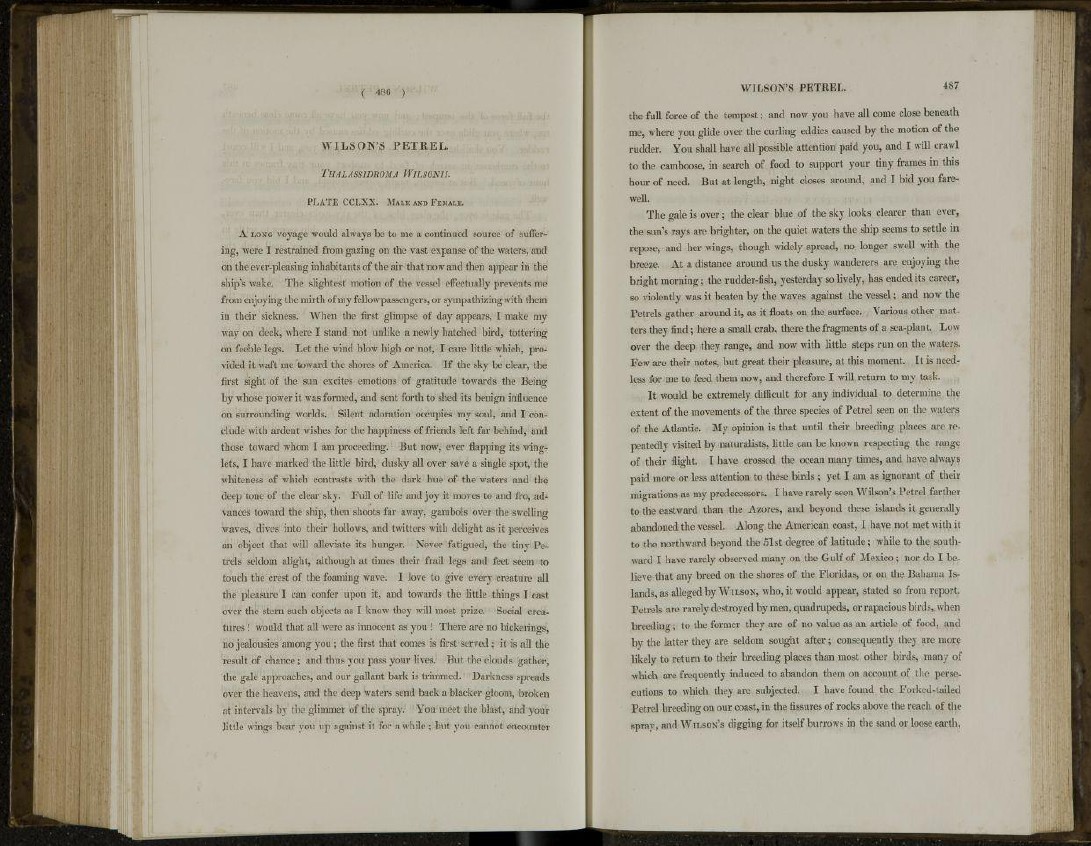
( 486 )
WILSON'S PETREL.
TlIALASSIDROMA WlLSONII.
PLATE CCLXX. MALE AND FEMALE.
A LONG voyage would always be to me a continued source of suffering,
were I restrained from gazing on the vast expanse of the waters, and
on the ever-pleasing inhabitants of the air that now and then appear in the
ship's wake. The slightest motion of the vessel effectually prevents me
from enjoying the mirth of my fellow passengers, or sympathizing with them
in their sickness. When the first glimpse of day appears, I make my
way on deck, where I stand not unlike a newly hatched bird, tottering
on feeble legs. Let the wind blow high or not, I care little which, provided
it waft me toward the shores of America. If the sky be clear, the
first sight of the sun excites emotions of gratitude towards the Being
by whose power it was formed, and sent forth to shed its benign influence
on surrounding worlds. Silent adoration occupies my soul, and I conclude
with ardent wishes for the happiness of friends left far behind, and
those toward whom I am proceeding. But now, ever flapping its winglets,
I have marked the little bird, dusky all over save a single spot, the
whiteness of which contrasts with the dark hue of the waters and the
deep tone of the clear sky. Full of life and joy it moves to and fro, advances
toward the ship, then shoots far away, gambols over the swelling
waves, dives into their hollows, and twitters with delight as it perceives
an object that will alleviate its hunger. Never fatigued, the tiny Petrels
seldom alight, although at times their frail legs and feet seem to
touch the crest of the foaming wave. I love to give every creature all
the pleasure I can confer upon it, and towards the little things I cast
over the stern such objects as I know they will most prize. Social creatures
! would that all were as innocent as you ! There are no bickerings,
no jealousies among you; the first that comes is first served ; it is all the
result of chance; and thus you pass your lives. But the clouds gather,
the gale approaches, and our gallant bark is trimmed. Darkness spreads
over the heavens, and the deep waters send back a blacker gloom, broken
at intervals by the glimmer of the spray. You meet the blast, and your
little wings bear you up against it for a while; but you cannot encounter
WILSON'S PETREL. 487
the full force of the tempest; and now you have all come close beneath
me, where you glide over the curling eddies caused by the motion of the
rudder. You shall have all possible attention paid you, and I will crawl
to the camboose, in search of food to support your tiny frames in this
hour of need. But at length, night closes around, and I bid you farewell.
The gale is over; the clear blue of the sky looks clearer than ever,
the sun's rays are brighter, on the quiet waters the ship seems to settle in
repose, and her wings, though widely spread, no longer swell with the
breeze. At a distance around us the dusky wanderers are enjoying the
bright morning; the rudder-fish, yesterday so lively, has ended its career,
so violently was it beaten by the waves against the vessel; and now the
Petrels gather around it, as it floats on the surface. Various other matters
they find; here a small crab, there the fragments of a sea-plant. Low
over the deep they range, and now with little steps run on the waters.
Few are their notes, but great their pleasure, at this moment. It is needless
for me to feed them now, and therefore I will return to my task.
It would be extremely difficult for any individual to determine the
extent of the movements of the three species of Petrel seen on the waters
of the Atlantic. My opinion is that until their breeding places are repeatedly
visited by naturalists, little can be known respecting the range
of their flight. I have crossed the ocean many times, and have always
paid more or less attention to these birds ; yet I am as ignorant of their
migrations as my predecessors. I have rarely seen Wilson's Petrel farther
to the eastward than the Azores, and beyond these islands it generally
abandoned the vessel. Along the American coast, I have not met with it
to the northward beyond the 51st degree of latitude; while to the southward
I have rarely observed many on the Gulf of Mexico; nor do I believe
that any breed on the shores of the Floridas, or on the Bahama Islands,
as alleged by WILSON, who, it would appear, stated so from report.
Petrels are rarely destroyed by men, quadrupeds, or rapacious birds, when
breeding; to the former they are of no value as an article of food, and
by the latter they are seldom sought after ; consequently they are more
likely to return to their breeding places than most other birds, many of
which are frequently induced to abandon them on account of the persecutions
to which they are subjected. I have found the Forked-tailed
Petrel breeding on our coast, in the fissures of rocks above the reach of the
spray, and WILSON'S digging for itself burrows in the sand or loose earth,